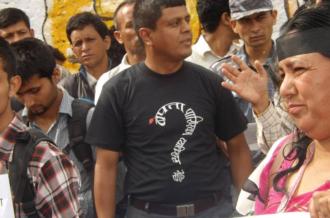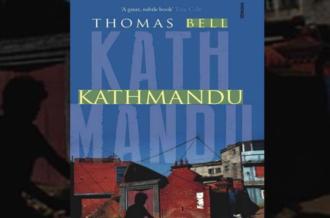UK’s ‘covert acts’ during Nepalese civil war
New book by British writer underlines UK’s involvement in torture and disappearance of Nepal’s Maoists during conflict.

Kathmandu, Nepal – On the eve of the International Day of the Victims of Enforced Disappearances on August 29, the UK ambassador to Nepal hosted a discussion with victims’ families, legislators, UN officials, and members of civil society.
At the meeting in Kathmandu, the ambassador spoke about his government’s enthusiasm to provide “technical support” to set up commissions to investigate human rights abuses during the Himalayan nation’s decade-long Maoist rebellion that ended in 2006.
Keep reading
list of 4 itemsPalestinian Prisoner’s Day: How many are still in Israeli detention?
‘Mama we’re dying’: Only able to hear her kids in Gaza in their final days
Europe pledges to boost aid to Sudan on unwelcome war anniversary
Missing in the ambassador’s speech was any mention of the UK government’s role in human rights violations during the bloody conflict that left thousands dead.
“It’s shameful that the UK helped Nepal’s security forces commit crimes against humanity but its government chose to stay silent about it,” said one participant, Ram Bhandari, after the event. His father, a retired teacher, was arrested by the security forces during the civil war. His whereabouts are still unknown.
“The UK government owes all the families of the disappeared an explanation,” he told Al Jazeera.
The reason for Bhandari’s anger is a detailed account of “Operation Mustang”, a covert operation carried out by the UK’s spy agency, the MI6, from 2003 to 2006.
Although it was reported in a local magazine in 2007, British involvement garnered renewed interested after Thomas Bell, a British writer, gave a detailed account of the operation in his book Kathmandu, released here two weeks ago.
Bell’s book alleges that MI6 used the covert operation to equip and train Nepal’s National Intelligence Agency. The information from the operation was used by Nepalese security forces to arrest, torture, and disappear civilians.
 |
| Ram Bhandari, the founder of the National Network of the Families of the Disappeared [Courtesy of National Network of the Families of the Disappeared] |
“The MI6 did whatever they could to help the Nepali intelligence service to infiltrate, disrupt, and arrest the Maoists in Kathmandu,” Bell, who is based in the old city of Patan, told Al Jazeera.
“There’s a famous case of Sadhuram Devkota, who went by the alias Prashant. He was arrested in 2004 and died in army custody soon after. He was definitely a target of “Operation Mustang”, Bell said.
Officials in the Nepali government could not be reached for comment at the time of publication. The spokesperson to the government and the Army refused to comment to Al Jazeera.
Similar to all covert operations MI6 runs, it was approved by the UK cabinet even though it was well-established by then, including through Amnesty International, that Nepal’s army and the police were torturing and disappearing people, and that UK officials brought up issues of human rights in their conversations with their Nepali counterparts.
The UK Foreign and Commonwealth Office’s annual report in 2003 claimed that the special representative of the British prime minister at the time, Sir Jeffrey James, “impressed on the Nepalese authorities, through regular contact with senior Nepalese government and military officials, the need to address its human rights record”. At that time, human rights experts from the British army also visited their Nepali counterparts.
In 2003, the year the UK government set up “Operation Mustang”, Nepal had the highest number of disappearances in the world, according to the United Nations Working Group on Enforced Involuntary Disappearances, and almost all of them were carried out by government agents.
“They [UK government] should answer what was going on, why they were doing it, what happened to the victims, and what do they know about the human rights abuses during that period,” Bell told Al Jazeera.
‘Human rights industry’
It has been seven years since Nepal’s Maoist rebels and the government signed a peace deal to end the war with the promise to make public, within six months, the whereabouts of those disappeared during the war and form the post-war reconciliation commissions.
That promise has been broken many times over, and six governments later, the families of the victims watch with dread those responsible for the crime get promoted by Maoists and non-Maoist governments alike.
Ram Bhandari, the founder of the National Network of the Families of the Disappeared, is one of those watchers, who alleges that officers linked to enforced disappearances have been promoted.
In one case, despite opposition from the families of the victims, Maoist Prime Minister Baburam Bhattarai, in 2012, promoted Colonel Raju Basnet, who was implicated in the torture and disappearance of at least 49 people, according to an investigation by the UN Office of the High Commissioner for Human Rights.
 |
| Thomas Bell, a British writer, gave a detailed account of the operation in his book Kathmandu [Gyanu Adhikari/Al Jazeera] |
It is not only the political parties that have abandoned the victims, said Manjima Dhakal, whose father was seized by the police. She said that transitional justice had become a “human rights industry” for NGOs to attract donor money.
Bell said that “transitional justice has been used by some people to selectively pursue their vehemence against one side of the conflict, the Maoists”.”The families don’t want the process to linger any longer. We need a sense of closure to move on,” said Dhakal. “But we also don’t want to see the perpetrators go unpunished.”
“What the army did during the conflict tends to be forgotten. Of course, this kind of politicisation of transitional justice is not conducive to achieve truth and reconciliation.”
Despite the hurdles ahead, Bhandari is optimistic that transitional justice in Nepal is turning a page.
 |
| Kathmandu is an account of ‘Operation Mustang’, a covert operation carried out by the UK’s spy agency, the MI6, from 2003 to 2006 [Courtesy of Random House India] |
“For the first time, the families are taking the lead,” he said, adding that the families were ready to engage with the proposed Truth and Reconciliation Commission and the Commission for the Disappeared.
The new Nepali government that came to power after last November’s elections passed a new amnesty bill in April that paved way for the formation of the two commissions.
In sharp contrast most of the human rights NGOs in Nepal – including the UN OHCHR, Human Rights Watch, and the International Commission of Jurists – have expressed criticisms of the bill, claiming that it leaves the room open for “amnesty” in serious crimes.
“Truth comes first, then justice,” said Pradip Pokhrel, former chairperson of the Nepal chapter of Amnesty International and a member of a committee to finalise the procedure to form the commissions. He said that serious offences, in the minimum “the symbolic ones”, will be prosecuted at a special court, but cautioned that much depends on the government’s will.
“We have to meet international norms and we will,” Pokhrel told Al Jazeera. “We have studied transitional justice in 42 countries, and are mindful that the world is watching.”
When the commissions start their public hearings, it is quite probable that “Operation Mustang” will surface again, bringing into renewed scrutiny the truth about UK’s role in Nepal’s civil war.
Follow Gyanu Adhikari on Twitter: @saatdobato